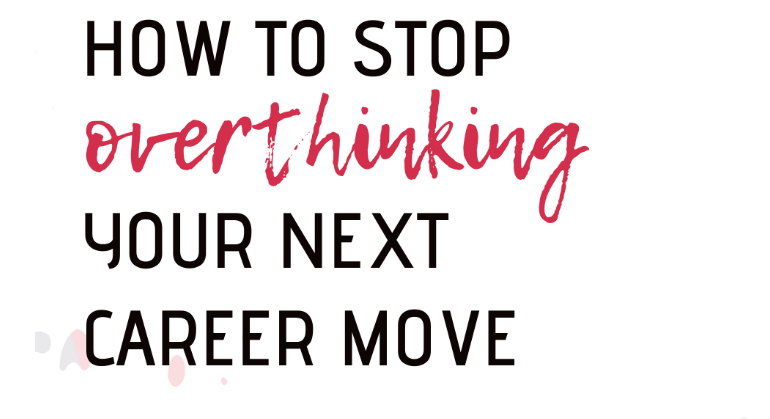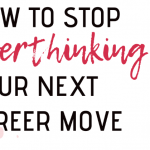How do you get started changing careers? Stuck in a Groundhog-Day reality of waking up to the same story every morning? Well, you’re not alone. Most people with the good intention of changing careers to pursue something more meaningful face the same problem to get started- overthinking and underacting.
It’s possible you’ve been thinking about it so much, so often, and for so long, it doesn’t even feel like a real possibility anymore. It becomes more like a fantasy or a daydream. Initially, it can be tempting to leave the prospect to get started changing careers in your daydream.
But daydreaming eventually gets old as all you really want to feel is progress, momentum and clarity which can’t be found in our wishful, frustrated career reveries.
Or with the help of Google, we spend hours endlessly browsing articles and job sites “feeling” productive. The problem is this doesn’t actually change anything about the situation. We are still in the exact same place. It’s what they call passive action. It’s deceptive and can be quite damaging to your progress.
At its core, passive action is really about opting out of any intense emotions. Being willing to fall flat on our face is terrifying. It brings up all our stuff about rejection, judgement, abandonment, and many more. Unfortunately being willing to fall flat on your face is essential if you’re going to get started changing careers in the real world, outside of the daydreams.
The reality is that it is only in the real world that your career change can come to life. That’s where progress lives. That’s where momentum builds and where clarity can be found.
So how do you get started changing careers?
Get Started Changing Careers – Take Action
We make decisions on a daily basis. We decide to eat healthier, drink more water or go to the gym more regularly. However, these decisions don’t mean anything unless we act on them. It’s an easy concept yet so hard to make the move from deciding to doing.
Understandably it can be hard to know what action to take to get started changing careers, especially when you’ve only been thinking about it and you’re still unsure about where you’re going and.
But the great thing about this situation is that you really have nothing to lose, except maybe a little time (and to be honest, if you’re not making any progress, you’re probably not using your time in an ideal way anyway).
The problem is that you can never make real progress if you don’t take action. All of the self-help articles in the world can’t save you if you never take action. Every time you read a book or article like this, immediately apply something from it. It doesn’t matter how big or small it is.
So what action can you take to help you move from deciding to doing on your career change journey?
Here are just a few things you can do.
Commit Yourself
When the American President John F. Kennedy was in office, he stood before the world and promised them a man on the moon within 10 years. Thing is, nobody had started working on a space program at that point. JFK had no data to back up his claims, no insight into the practicality of space travel.
When you’re considering how to get started changing careers, it’s easy to spend time wallowing in indecision. We have a natural tendency to not want to close doors, so instead, we will scramble back and forth to keep each option open “just in case.” Instead of helping us, this leads to a debilitating sense of indecision which prevents us from being productive.
Thinking and planning in advance is important, vital in fact, to your success but acting is even more crucial to long-term achievement.
So if a career change is actually going to happen, you might need to give yourself a little push. So take a leaf out of JFK’s book.
Give your career change a little injection of “no turning back now…”
Now, I’m not suggesting that you throw in a letter of resignation to your manager tomorrow, pack up your desk and moonwalk out of the office. Taking inspiration from JFK can take all kinds of forms, and it doesn’t have to mean putting your livelihood on the line.
It could be giving yourself a deadline to complete a task or goal and telling your friends or colleagues at work about it. Just the act of telling people what you are up to can be enough pressure to get you moving.
Once you commit to getting started, momentum carries you. Producing results builds positive momentum. With momentum, you’ll get ahead and make progress much faster.
Make the time
“There are 24 hours in a day, if you only sleep 6 hours a day then you have 18 hours left. Most people work 8 or 10 hours.
So Now you still have 8 hours left. What do we do with these 8 hours is really the question” –Arnold Schwarzenneger
That really is the question when it comes to making the time to focus on your career change. If you’re not prioritising your career change right now, you can be pretty sure your dream career isn’t going to magically materialise out of anywhere in the next week, month or year.
Depending on your situation, spare time can be more difficult to come by, particularly if you have a family. Unfortunately, regardless of circumstance, you will have to find the time. Nothing worthwhile comes easily but your future self and those around you will thank you for it.
So what Can you do?
Make an event of it. Have a goal you want to achieve with that spare hour. Take yourself to your favourite coffee shop to send out a few emails, apply for jobs or just read a book about something you would be interested in pursuing. Or it could be something more active, such as attending a networking event or going to a job expo.
You will experience the “first action effect” that makes it easy to stay productive. The important thing is to continue taking continuous action. Make the time on a regular basis to do something related to your career change goal. These small tasks add up quickly and help build confidence by seeing achievement.
It may take a little practice to use this strategy to consistently take action. But the benefits are huge.
By dedicating time to your career change, there is a greater chance of it becoming a reality.
Get Talking
“The fact is that you can’t hit a target you can’t see. If you don’t know where you are going, you will probably end up somewhere else. You have to have goals”– Zig Ziglar
If you don’t know that a job exists, it can’t possibly get on your radar.
New possibilities and ideas come into your life through conversation. Now is the time to get talking. It’s about finding people, not jobs. It’s time to have real conversations with people who do the kinds of things you’re curious about and keen to explore.
Have what is called informational interviews. It was actually one of my favourite stages to get started changing careers. Because you are simply just talking to people who do something that sounds interesting, without putting pressure on yourself that you are going to find the job that you’re going to do next.
You can talk to your friends and family, and you can talk to a neutral third party like a career coach.
So, if you want to see real-world, tangible progress on your career change, get started talking about it. A lot.
Ask for Help
Everyone needs help. To get started changing careers alone, with no help is simply not possible and is also going to be an incredibly lonely journey for you. Yet too many of us avoid asking for help. We’re used to being independent and well trained in the art of not- asking.
We grow up believing we should have all the answers, and if we don’t then we should hide the fact that we don’t, because it’s shameful.
There’s no shame in being open about your professional ambitions — in fact, it’s advisable. If you don’t make it clear what you want, how will anyone help you get there?
The problem is that not wanting to be seen as needing help is the single, most destructive element of the way people approach their career change.
The truth is that asking for help makes you vulnerable. One of the main reasons we don’t ask if for the fear of rejection. The fear people will laugh or see us as incompetent.
Another truth is that people actually want to help. It’s a natural instinct that some studies show is present at birth. Helping others gives us a greater sense of purpose. There is nothing more flattering than a request for help from someone who respects who you are and what you know. So let down those walls and give people the opportunity to help you.
Another reason we avoid asking for help is that we fear people will stop liking us or lose respect for us. It’s nonsense. Nobody will think less of you because we all get stuck from time to time. If anything, most people remember what it’s like to be in a similar position. Our openness connects us with people and helps us to easily relate to each other.
So don’t beat around the bush or become overly apologetic. Your friends, colleagues, and family all have had good reasons to help you in the past since they respect and care for you. Give others an opportunity to lend a hand.
Invest in yourself
“Investing in yourself is the best investment you will ever make. It will not only improve your life, it will improve the lives of those around you” – Robin S. Sharma
If you don’t, who else will?
When you invest in yourself, a world of opportunities will open up for you. It can be investing time on learning how to set goals, investing time in your creativity, upskilling or investing in building your confidence.
You and only you have to be proactive enough to take that responsibility.
The problem is that if we don’t prioritise our own happiness and invest time into doing something that fulfils us, as individuals, we tend to have less energy, complain more, feel more resentment, and criticise ourselves and others.
Investing time in yourself in the pursuit of personal fulfilment and happiness can leave you with a feeling that you are being selfish. Ignore the battle with that inner critic that tells you this. By investing in yourself emotionally, physically or spiritually, it will allow you to become the best version of yourself. When you are the best version of yourself, you will be an attraction magnet to others.
How do you determine what skills you need to invest in?
Writing a personal gap analysis can be really helpful when it comes to knowing where to get started changing careers. It will indicate what additional skills you may need. Writing a personal gap analysis involves knowing what skills you want to master and the levels of the skills you already have to determine the differences, or gap, between the two. In addition, a personal gap analysis details what you need to do to reduce the gap.
By assessing your skills and qualifications in comparison to your requirements, you’ll be better prepared to “mind the gaps” and move in the right direction to achieve your goals. Reducing the gap may mean going back to college to obtain a new qualification. A gap could also be emotional-based and could be that you lack the confidence to move forward. No matter what gap needs to be filled, what you will be capable of achieving tomorrow will largely depend on what you do to improve yourself today.
So what will you do today?
Get started changing careers. If you want to start by getting ready for a job interview, check out our 12-step interview checklist.
If you want expert advice, book a 15 min free call with one of our excellent career coaches.








